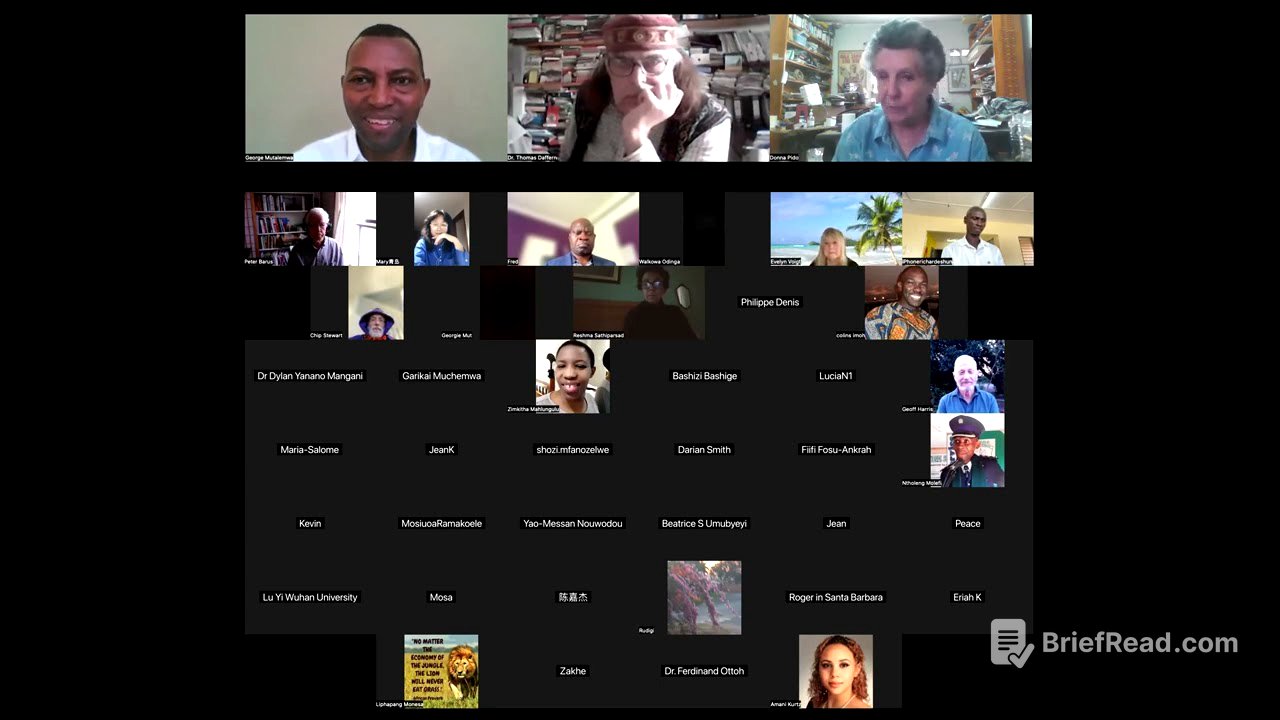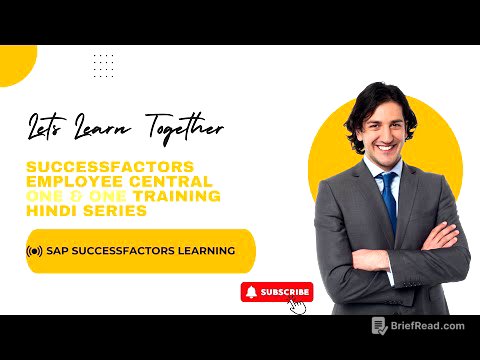TLDR;
This session, moderated by George Mutmoa, features Professor Jeff Thomas Harris discussing the importance of action research in peace studies and sustainable development in Africa. Harris argues that traditional research is insufficient for creating change and advocates for a participatory approach where researchers and participants collaborate to explore problems, plan and implement interventions, and evaluate outcomes.
- Action research, rooted in the work of Kurt Lewin, emphasises taking action to bring about positive change, not just increasing knowledge.
- Participatory action research involves researchers and participants working together, with the researcher acting as a facilitator.
- Challenges include resistance from traditional researchers, difficulties in precise planning, and the time-consuming nature of involving people.
Introduction [0:00]
George Mutmoa introduces the session on Global Peace Studies for Sustainable Development in Africa, focusing on why most research should be action research. Professor Jeff Thomas Harris, from Durban University of Technology, is the speaker. Harris has a history with the Africa Peace and Development Network and is a published author and experienced PhD supervisor.
Jeff Harris's Background and Introduction to Action Research [7:55]
Jeff Harris provides his background, starting as an economist influenced by the Vietnam War, then focusing on military spending in developing countries, and eventually teaching peace studies. A turning point was supervising a student whose research involved helping refugee women in Durban find alternative ways to discipline their children. This experience converted Harris to action research, though he acknowledges the value of other research types, such as the work of Erica Chennowith and Maria Stefan on nonviolence effectiveness. Harris primarily educates doctoral students in action research, with many students from African countries conducting such research.
The Foundations and Stages of Action Research [12:38]
Action research is rooted in the work of Kurt Lewin, who emphasised the need to take action to create change, not just understand a problem. Harris outlines four typical stages: exploring the problem (diagnosis), planning an intervention (prescription), implementing the intervention, and evaluating the short-term outcomes. He likens these stages to a medical process, where a doctor diagnoses, prescribes, implements treatment, and evaluates results. Reflection is crucial at each stage, allowing for adjustments as the environment and people involved change.
Action Research Cycle [18:41]
The four stages of action research – analysing/diagnosing, planning action, taking action, and evaluating action – form a cycle. If time allows, the cycle can be revised based on lessons learned to improve outcomes. Action research has been widely used in school environments, but often there isn't time for more than one cycle.
Applications of Action Research [20:01]
Action research can be applied to various research products, including training, resolving intergroup conflict, healing from trauma, building peace infrastructures, and restorative justice programs. Examples include training Nigerian journalists in nonviolent reporting, training prisoner officers in rehabilitation, and implementing restorative discipline practices in schools. These projects often fit into multiple categories.
The Participatory Aspect of Action Research [25:53]
Action research goes beyond traditional research by promising change in a limited context. It emphasises the participatory aspect, involving researchers and participants in all stages. This can be uncomfortable for researchers due to power structures. The researcher should act as a facilitator with no more votes than any other participant, aiming to bring about social change that promotes democracy, harmony, and equality. Constant reflection and adjustment are necessary, and the goal is to develop participants' capacity to tackle other situations needing change.
Obstacles and Challenges in Action Research [30:58]
There are several obstacles to action research. Some traditional researchers dislike it, viewing it as subjective and not the role of a researcher to bring about change. Precise planning is difficult, irritating those who evaluate proposals. Time and people pose challenges, as involving people requires time for negotiation and can uncover resistance from those benefiting from existing power structures. Collecting data for a dissertation while doing action research can also be tricky, requiring collaboration.
Key Themes in Action Research [36:17]
Key themes learned over years of doing action research include: being participatory, expecting indifference and resistance, being reflective, practising reflexivity, and considering the long-term impact. An example is given of a peace garden set up in a Zimbabwean village community divided by political parties, which fostered cooperation and rebuilt trust. Relationships are central to action research, requiring trust and respect. Positive short-term outcomes are common, but the long-term impact is crucial and warrants further research.
Collaboration and Examples of Current Projects [43:19]
Collaboration is essential for good action research, requiring people to help collect data and participants from the community to work together. Current examples include exploring discipline practices in schools, encouraging prison officers to become agents of rehabilitation, and peacebuilding in Palestine. One project involves developing a code of conduct for online communication between conflicting political groups in Palestine.
Discussion and Questions [47:19]
The presentation opens for questions and discussion. Donna shares her negative experiences with participatory research in Kenya, where collaborators were only interested in stealing money. Fred reflects on how academic settings and research can better respond to societal needs. Jeff suggests approaching situations with limited prior knowledge and assumptions.
Ethical Considerations and Power Dynamics [57:45]
Richard emphasises that marks and money are not good motives for research; love and genuine interest are needed. Thomas questions the relationship of theory to action, stressing the importance of a feedback loop between them. Tah Mati highlights the power relations within research structures and the need to defend each participant's voice.
Relevance, Respect, and Compensation [1:14:13]
Evelyn stresses the importance of relevance, respect, and compensation when involving people in research. Compensation should account for their time and effort. Fred discusses the ethical and transformational aspects of participatory research, emphasising the co-creation of meaning and the improvement of participants' quality of life.
Challenges and Validity [1:23:43]
Donna points out that researchers are not always the ones holding the power, as participants can provide false information. This underscores the importance of validity, reliability, and trustworthiness in research. Peter connects the discussion to Ian McGill's work, highlighting the importance of relationships and the limitations of static snapshots of life.
Relational Aspects and Positionality [1:28:54]
Jean emphasises the relational aspect of action research, highlighting the importance of building relationships and mobilising allies. Mariam shares her experiences as an East African researcher, noting the challenges of paying participants and receiving inaccurate information. Sana discusses the importance of the researcher's positionality and strategy, advocating for critical action research and adapting the research cycle.
Final Comments and Summary [1:39:10]
Jeff concludes by expressing his appreciation for the insightful comments and acknowledging the wider scope of the issues discussed. He hopes the presentation was worthwhile and thanks everyone for their time.









